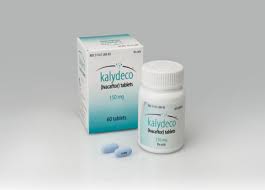The Food and Drug Administration today approved a new drug for the treatment of Cystic Fibrosis three months earlier than expected..
This comes as exciting news for families with anyone with this dreaded illness.

Cystic fibrosis is a disease caused by a gene mutation which causes a defect in chloride transport across the cell membrane in pulmonary and pancreatic cells. It causes severe malnutrition as well as pulmonary insufficiency leading to markedly premature death. Without treatment the average survival rate is 8-13 years.
This blinded placebo study of 213 patients revealed a marked improvement in lung function and reduction of disabling symptoms
The first version of this treatment was released for immediate use. It is meant for persons with the G551D CFTR mutation. Prior cystic fibrosis treatments included drugs that alter effects of the defective CFTR protein which produce thin mucous, antibiotics to fight infection as well as enzyme replacement for severe pancreatic enzyme deficiencies.

The drug known as Kalydeco and developed by Vertex Pharmaceuticals, counters the effect of one specific mutation in the gene that accounts for 4 percent — or about 1,200 — cystic fibrosis cases in the United States.The drug is approved for patients age 6 and older with the G551D mutation.
Although Kalydeco treats a very small subset of CF patients,The Cystic Fibrosis Foundation said there is an ongoing phase 2 trial for people with the more common CFTR gene mutation, using Kalydeco alongside a second experimental drug, VX-809. Findings from the first part of this trial have been encouraging, with the second part still underway.
Kalydeco, known generically as ivacaftor and during its development as VX-770, will cost $294,000 a year, a price roughly in line with those of some other drugs for extremely rare diseases. Vertex said it would have various programs to help patients pay for the drugs or obtain them free.
About 30,000 Americans have cystic fibrosis, which is caused by mutations in a gene called CFTR that is responsible for transport of chloride ions across cell membranes. People with the disease tend to have thick mucus in the lungs, which leads to infections and lung damage. Their average life span is 37 years.

Venture philanthropy played a large role in the drug study. The Cystic Fibrosis Foundation invested $75 million dollars from it’s charitable treasuries into Vertex Pharmaceuticals after assessing early animal studies which predicted the potential for the new drug. The CF foundation raises about $ 40 million dollars each year with it’s annual “Great Strides for Cystic Fibrosis” and the “65 Roses’ fundraisers each year. The events are held annually in many cities by the local chapters of the CFF.
The gene controlling CFTR was discovered 25 years ago, and it has taken that long for translational research to produce a successful treatment. This treatment is not a genetic treatment (which was attempted, and failed) but a direct repair/replacement for the defective chloride transferring protein in cell membranes.
The story of how the term “65 Roses” came about is one unto itself,
Mary G. Weiss became a volunteer for the Cystic Fibrosis Foundation in 1965 after learning that her three little boys had CF. Her duty was to call every civic club, social and service organization seeking financial support for CF research. Mary's 4-year-old son, Richard, listened closely to his mother as she made each call. After several calls, Richard came into the room and told his Mom, "I know what you are working for." Mary was dumbstruck because Richard did not know what she was doing, nor did he know that he had cystic fibrosis. With some trepidation, Mary asked, "What am I working for, Richard?" He answered, "You are working for 65 Roses." Mary was speechless.
Since 1965, the term "65 Roses" has been used by children of all ages to describe their disease. But, making it easier to say does not make CF any easier to live with. The "65 Roses" story has captured the hearts and emotions of all who have heard it. The rose, appropriately the ancient symbol of love, has become a symbol of the Cystic Fibrosis Foundation.
65 Roses® is a registered trademark of the Cystic Fibrosis Foundation.
In 1969 when I was a pediatric intern at Henry Ford Hospital I cared for three children ages 7-10 years old with severe pulmonary insufficiency and malnutrition. None weighed more than 60 pounds. None lived another six months.
Fast forward 20 years.
In 1991 we were served with the diagnosis of cystic fibrosis in my second son. I promptly passed out.
He is now age 23, the beneficiary of early effective treatment (starting in 1994) with Pulmozyme (DNAse which thinned his thickened pulmonary mucus, inhaled Tobramycin to suppress Pseudomonas and to treat MRSA. The CF gene was identified early in his life. He has been in several FDA clinical trials for new drugs that will soon be released.
The financial challenge to families with this disease is enormous. His monthly prophylactic treatments average $3500-5000/ month.(when he is well) About every 12-18 months he receives a three week course of two or three antibiotics at home via a percutaneous intravenous line. The treatment is started at the CF center and then continues as an outpatient at home.


 Who will rule, after man destroys himself?
Who will rule, after man destroys himself?

